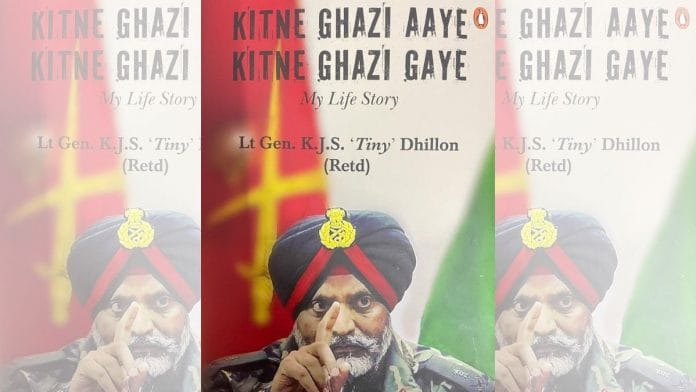New Delhi: “Agar itihaas likhna hai, toh kisi ko itihaas banana padega’ (if we have to write history, someone has to make one),” writes retired lieutenant general and head of the army’s strategic XV Corps, K.J.S. Dhillon, in an autobiography, Kitne Ghazi Aaye Kitne Ghazi Gaye, published by Penguin on 14 February.
According to Dhillon, this is what he had told Union Home Minister Amit Shah, when the latter had asked “What is the guarantee that things will remain peaceful (on abrogation of Article 370 in Jammu and Kashmir)?”, during an hour-long breakfast meeting in June 2019.
Shah’s Srinagar visit on 26 June, 2019, said Dhillon, was to give final touches to the government’s resolve to carry out abrogation of Article 370 in Jammu and Kashmir, and during his meeting with minister, Shah had asked him about the repercussions of the action and a possible reaction to that. “Peace will not be disturbed in any way, was my assurance to the Home Minister,” writes Dhillon.
India abrogated Articles 370 and 35 of the Constitution — a provision that afforded special status to Jammu and Kashmir — in 2019, and Dhillon’s autobiography gives a detailed peek in the days leading to the announcement.
Along with these details, he writes of a dinner party hosted for former Indian cricket captain Mahendra Singh Dhoni during the same time, where Dhillon, despite being the host, reached late.
The book, in which Dhillon spills minute details of the meeting with Shah, encapsulates the entire situation around the area on 5 August, 2019, when the central government made the final decision on Article 370. The tension in the Valley and the secrecy around the information are palpable in his words.
Narrating the sequence of events, Dhillon writes, “I got a call at 2 am informing me about the meeting with the home minister at 7am. This information had barely sunk in, when I got another call an hour later. This time I was asked about my choice of food of breakfast.”
Till this time, the author writes, he was not ready for the bombshell and was humble about the invite. “You will be the only one attending the meeting, I was told. It is intended to be a one-on-one duologue with you,” the author writes.
Dhillon mentions that he arrived sharp at 7 am and Shah was ready for the day’s events, and what followed was an hour of intense discussion.
“The discussions included understanding the reaction of Pakistan to the ‘path-breaking declaration’, repercussions on the Line of Control and the pros and cons with respect to an anticipated Pakistani reaction,” reads the book.
Dhillon writes: “I must point out that the home minister was in absolute control and fully conversant with the agenda… he had done extensive research and homework… he was seeking some intrinsic and key issue related to the Army and its operations… he also touched upon the flashpoint and possible events that could occur, more importantly, how we would handle the eventualities.”
“His parting words at the end of the meeting were ‘what is the guarantee that things will remain peaceful’. And my honest and confident reply was ‘on my part, I assure you that peace will not be disturbed’,” recalls Dhillon.
Impressed by how Shah was prepared for the situation, Dhillon writes, “The home minister’s knowledge and in-depth assessment of the situation, including the likely fallouts, was exceptional.” At home, to the wife’s queries about the meeting, Dhillon recalls replying, “bees yuvraj mil kar bhi iss bandae ka (a reference to Shah) muqaabla nahi kar saktae (20 princesses together cannot match up to this person)”.
Chinar House, an official residence of the Chinar corps commanders, is known as a place from where not even a shred of paper goes out of the four walls, says the book. This became the meeting ground, writes Dhillon as “maintaining secrecy of the impending government decision was the main pre-condition without compromising on the preparation”.
Also Read: Why changing Ladakh L-G may not be enough to cool agitation — ‘feeding uncertainty’
Dinned with Dhoni
On 5 August, as the Parliament was discussing the abrogation of Article 370, Dhillon was busy in a strategy meeting for a very famous guest.
“Former Indian cricket team captain Mahendra Singh Dhoni, a territorial Army officer of the rank of Lieutenant Colonel, had come to Kashmir for a training schedule with his battalion that were deployed in Chinar corps at that time,” Dhillon narrates.
The same day, the entire team of security forces met in the evening to take stock of the situation. National security adviser Ajit Doval also arrived in the evenings and stayed there for about fortnight, personally chairing all the daily meetings of the security teams, the author narrates.
“Taking a break, Dhoni met me at my office on that day, and the same evening, he was slated to visit my residence for dinner with others. We were all busy with the preparation to deal with the situation post the abrogation but had to carry out all routine activities — mostly to showcase normalcy and not let inimical elements gauge our intentions. In the Army we call this ‘surprise and deception’ and I daresay, we achieved it to the hilt of military precision,” writes Dhillon.
The announcement of the abrogation of Article 370 on 5 August, 2019 led to a mountain of work for Dhillon, he adds.
“I was extremely busy figuring out our future plans, which could now get stymied if things were not controlled in time. Hence, despite being the host for the dinner party, I returned home at 11.30pm, where all the guests, including Dhoni, were waiting for me.”
(Edited by Richa Mishra)
Also Read: Before Art 370, Nehru was ‘irritated’ by Sheikh Abdullah’s Kashmir interview






